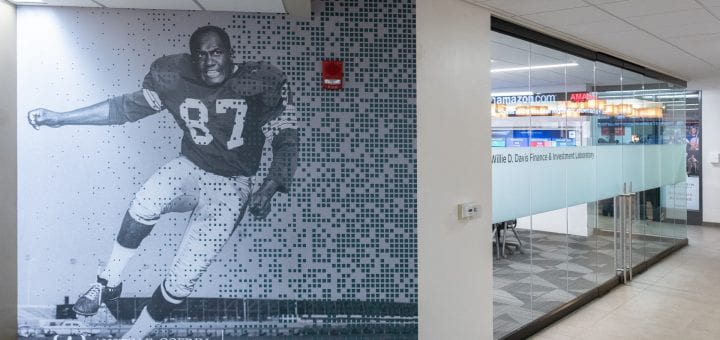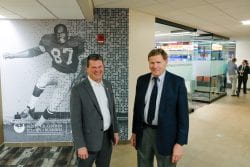
Willie D. Davis Finance & Investment Laboratory
A new lab opening on the University of Wisconsin-Green Bay will give students access to the tools they need to become investment managers, including real money.
The Willie D. Davis Finance & Investment Laboratory, will be home to the Student Managed Investment Fund that provides students in finance the opportunity to participate in real-world trading and investing, said Kevin Jaklin, the lab’s manager and an associate lecturer in the UW-Green Bay Finance program.
The lab’s official grand opening is Thursday, May 5, 2022 with a short program from 5:30 to 6 p.m. and tours before and after. On Monday, May 2, 2022, the University made a formal announcement about its “Ignite the Future” campaign, with tours of the newly remodeled spaces in the Cofrin School of Business.

From left, Dean Matt Dornbush poses with Green Bay Packers’ President/CEO Mark Murphy near the Willie D. Davis Finance and Investment Laboratory on the Green Bay before the start of the Ignite the Future Campaign kick off event, May 2, 2022. UW-Green Bay, Sue Pischke University Photographer
Using real money provided by donors, the students will work together in teams to research companies, buy and sell stocks, and report on how their investments are doing. The lab’s 35-seat classroom simulates a business class trading floor with LED tickers, and specialized terminals for market data. Jaklin said the experience goes beyond just the simulations though.
“When their performance results come in, they’re going to have to report those to the board,” Jaklin said. “They’re going to get real-life experience, because that’s what financial professionals do. Everybody can meet with boards and individuals when (investment) performances are strong, but when performance is weak, you still have to talk to them. This way, (the students) will get both sides of the equation.”
It will be hands pm experience, he said, for anyone hoping to pursue a career with an investment firm – whether it’s within a bank, an insurance company, a mutual fund, or the office of a financial advisor.
For students, it also means graduating a step above their peers when it comes to job searches.
“They’ll get hands-on experience actually investing money, making those decisions, explaining those decisions to board members, just like you would do in real life,” Jaklin said. “In addition to that we’re going to bring in professionals from the area to be mentors , so they’ll be able to network and have contacts within the industry, which will help them in their careers after they graduate. They’ll also be able to better understand the career paths that are available to them, whether they decide to go financial planning route or more of an investment analyst route.”
Just like in real investing, the students will be managing two funds with two different pools of money – the first, a traditional investment portfolio with no constraints, and the second, a portfolio constrained by environmental, sustainability and governmental investment policies that coincide with the environmental sustainability policies of the university, he said.
The lab was made possible thanks to a grant from the Green Bay Packers in honor of late football great Willie Davis. Long an advocate of education, Davis passed away in April of 2020 after a brief illness. The Green Bay Packers Foundation grant and the laboratory will benefit the university and the Green Bay Community as a whole, university officials said.
“Willie D. Davis understood well that financial literacy is a great equalizer, and so do the Green Bay Packers,” said UW-Green Bay Chancellor Michael Alexander. “We are grateful for their impact grant to this new initiative, which will be a game-changer for our students, the Cofrin School of Business, and the region we serve.”
Davis received his Master of Business Administration from the University of Chicago Booth School of Business. After 10 years as a football player, Davis used his MBA to become a successful entrepreneur, eventually sitting on the boards of several Fortune 500 companies including Alliance Bank, Dow Chemical, Johnson Controls, K-Mart, L.A. Gear, Metro-Goldwyn-Mayer, Rally’s Inc., Sara Lee and Schlitz Brewing, to name a few.
Now that the majority of the construction completed, the lab will open to classes and events in the spring semester and the Student Managed Investment Fund class will begin in fall of 2022.
Davis’ passing led to the grant, Jaklin said. Once the school received the grant, construction on the lab could begin. The lab will open to classes and events in the spring semester, but students won’t be able to take part in the Student Managed Investment Fund until Fall 2022.
In order to qualify for the program, students will have to have taken a base of finance classes before applying to participate. Faculty within the finance department will chose the students they feel are most qualified.
Already, Jaklin said, looking at a potential link with the CFA Institute. The CFA Institute provides Chartered Financial Advisors with a designation that signifies the advisor’s commitment to professional development in investment management. The designation of CFA charter holder for investment advisors is widely valued by employers in every sector of the global finance industry.
CFA-affiliated schools embed portions of the CFA Program Candidate Body of Knowledge, as well as a Code of Ethics and Standards of Professional Conduct into their curriculum. The affiliation signals to students and to employers that the school’s curriculum is closely tied to the CFA Program when it comes to investment management.
“We’re in the process of becoming a CFA-Affiliated program for investment and if successful, we would then become one of only four in the state now,” Jaklin said.
That affiliation would be another feather in the school’s cap, as it shows employers that students have been provided with CFA-aligned instruction.
Students will have the ability to use the lessons learned from that instruction in the lab, Jaklin said.
And using real money will have real results, he said. Any gains the students see will be used to provide scholarships to the school.
“There’s two types of risk,” he said. “The first is financial risk, which is easy to determine – how much money can you lose within a certain risk parameter. That’s the easy part because you can calculate that. However, the other side, is the emotional risk of investing which is much more difficult to control… When you invest emotionally, it adds a layer of complexity to it. That’s really where they’re going to get the value of it. They are going to be able to say ‘Okay, this is real money. If my investment choice goes up, that’s great. But what happens if it does down? They’re going to get real life experience on what that’s like.”
Story by Liz Carey, freelance writer
Photo by Dan Moore, Marketing and University Communication
Link to original story: https://news.uwgb.edu/featured/05/03/new-willie-d-davis-finance-investment-laboratory-allows-students-to-invest-in-stocks-with-real-money-and-see-real-results/
